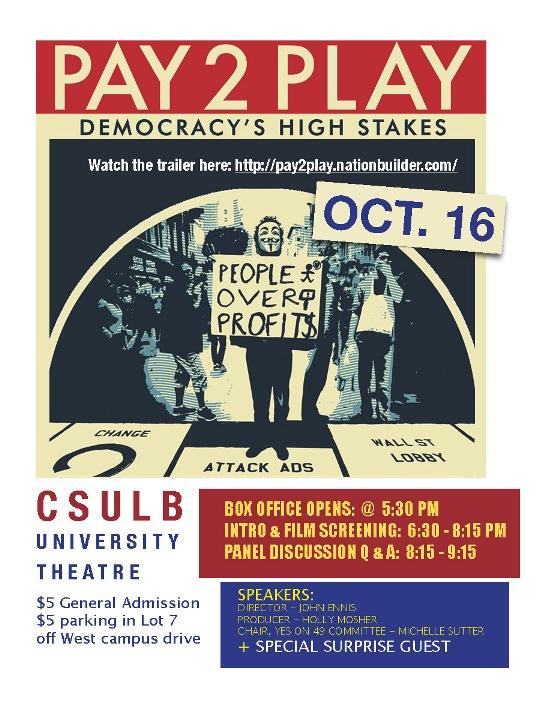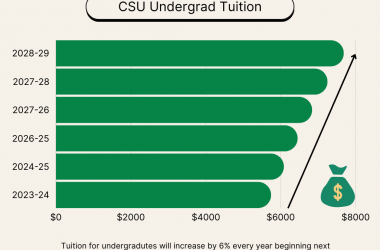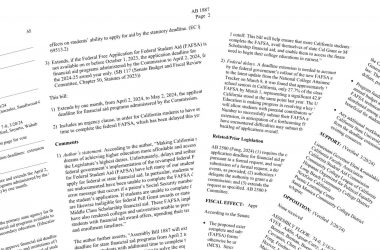The Cal State University Long Beach College Democrats club will host a screening of “Pay to Play” on Thursday in the University Theater.
“Pay to Play” is a documentary about the corruption of big corporate money funding political campaigns and the effect that has on the American democratic system, according to a press release.
John Ennis, writer and director of the film, said that although America has a good democratic system, he wonders if it is still working to serve the people.
The documentary explores the idea of the “pay to play” concept, which argues that in order to have a valuable say in the political system, one must pay large amounts of money.
In the film, Surya Yalamanchili tries to run for Ohio state congressman in 2010 without using any donations from big businesses. He raises more donations from individual voters than his opponent Jean Schmidt, but had less donations because Schmidt accepted corporate donations. Yalamanchili lost the race, with only 35 percent of the votes, according to the documentary.
Abigail Mejia, CSULB College Democrats president and political science senior, said she wanted the club to host this screening because it is important for students to know what is happening in political campaigns.
“All our voices are not being represented because big money gets all of the attention of public officials,” Mejia said.
The film covers aspects of how the American political system is set up, and how money influences elections, Mejia said.
“We want every voice to be represented, no matter what financial level,” Mejia said. “That is the foundation of democracy and equality in this nation.”
Nestor Moto, Long Beach State Collage Republicans (LBSCR) president and accounting junior, said that he agrees that the “pay to play” system is in place and is not the best, but it takes money to run a successful campaign.
“One thing we don’t hear about in the media or from the democrats is how [democrats] use big money for campaigns too,” Moto said. “They’re against big companies, but they use them too.”
Mejia said that campaign financing is something everyone running in a political race needs to do.
“But we must question why these corporations are funding these campaigns,” Mejia said. “What is their motive?”
Moto said he thinks that although this system is flawed, it is not a “big issue.” He said the LBSCR are more concerned with voter turnout for this year’s elections.
“In the end, the ones that ultimately decide things are the voters, not the money,” Moto said.
Cyndy Fowler, the chairman of Yes We Can, the organization that created the film “Pay to Play,” said the organization wanted to screen the documentary on campus as a way to “build student awareness on the issue” and thereby motivate them to register to vote.
“Our representatives are less interested in promoting the good of the many and instead promote the good of the few – those with money and power to wield,” Fowler said. “This film is especially necessary because the problem is never discussed by the corporate media, since they profit from the unlimited money spent on elections.”
Campaign money “doesn’t” work that way. There is corporate money going into political races, but donors “should not” expect to be paid back for what they give to candidates, Moto said
Moto said, “I mean, it’s a donation.” He said that it takes a lot of money to run a successful campaign and run commercials. He said that it is “simply necessary.”
This film suggests that to break the cycle of “pay to play,” America must get someone into office who is not there “as a business expense.”
Adam Winkler, University of California, Los Angeles law professor, said in the documentary that big money does fundamentally have a role in our government.
“The idea that corporations are going to take over American politics, that’s nonsense,” Winkler said. “Corporations have already taken over American politics.”
The screening of “Pay to Play” is Thursday, Oct. 12 at 5:30 p.m. Admission is $5. A Q-and-A will be held with film producer Holly Mosher and Michelle Sutter, chair of the “Yes on 49” committee. Mejia said a surprise guest appearance is expected.
The voter registration deadline is Oct. 20, and voting day is Nov. 4.





It takes money to run an election, but money by itself does not win elections.
There are plenty of examples of wealthy candidates who spent tens of millions of their own money, and still lost the election.
This obsession against corporations from those of you on the left, is absurd.
I’m sure you would not object to a corporation spending millions in advertising in order to sell their products, but when they decide to spend THEIR OWN MONEY to support an initiative, or to support the candidate that they feel will better represent their interests, then all of a sudden you have a problem.
There are wealthy individuals and corporations on all sides of the political spectrum, so it is not like it is all on one side.
The right to promote and support the candidates who are more in line with our own views and values is at the heart of our democracy.
Trying to restrict that right and that freedom is never a good idea.